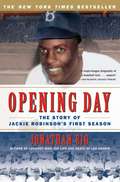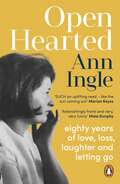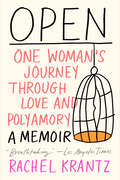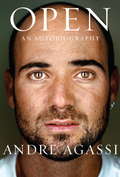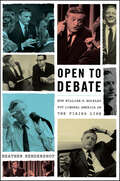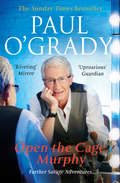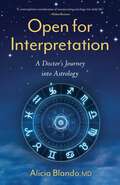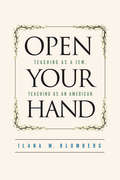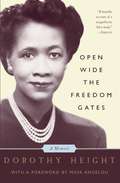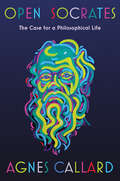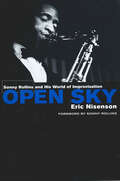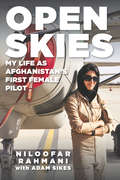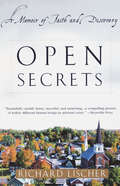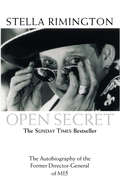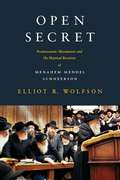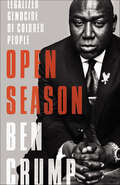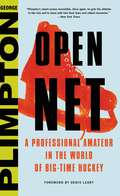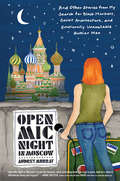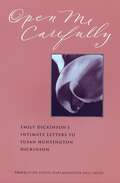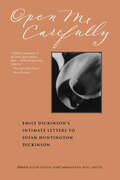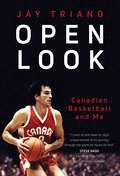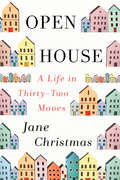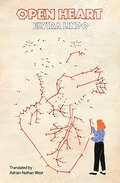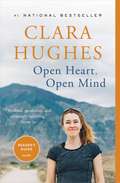- Table View
- List View
Opening Day: The Story of Jackie Robinson's First Season
by Jonathan EigThis bestselling account of the most important season in baseball history, 1947, tells the dramatic story of how Jackie Robinson broke the color barrier and changed baseball forever.April 15, 1947, marked the most important opening day in baseball history. When Jackie Robinson stepped onto the diamond that afternoon at Ebbets Field, he became the first black man to break into major-league baseball in the twentieth century. World War II had just ended. Democracy had triumphed. Now Americans were beginning to press for justice on the home front—and Robinson had a chance to lead the way. In Opening Day, Jonathan Eig tells the true story behind the national pastime’s most sacred myth. He offers new insights into events of sixty years ago and punctures some familiar legends. Was it true that the St. Louis Cardinals plotted to boycott their first home game against the Brooklyn Dodgers? Was Pee Wee Reese really Robinson’s closest ally on the team? Was Dixie Walker his greatest foe? How did Robinson handle the extraordinary stress of being the only black man in baseball and still manage to perform so well on the field? Opening Day is also the story of a team of underdogs that came together against tremendous odds to capture the pennant. Facing the powerful New York Yankees, Robinson and the Dodgers battled to the seventh game in one of the most thrilling World Series competitions of all time. Drawing on interviews with surviving players, sportswriters, and eyewitnesses, as well as newly discovered material from archives around the country, Jonathan Eig presents a fresh portrait of a ferocious competitor who embodied integration’s promise and helped launch the modern civil-rights era. Full of new details and thrilling action, Opening Day brings to life baseball’s ultimate story.
Openhearted: Eighty Years of Love, Loss, Laughter and Letting Go
by Ann IngleSHORTLISTED FOR TWO IRISH BOOK AWARDS'Something they don't tell you about getting older is that you fall. Oh, you hear about it in passing, of course, "She had a fall, poor thing". Falling is not something you ever think about as a younger woman. You think about falling in love . . .'At 20 Londoner Ann Ingle fell madly in love with an Irish fellow she met on holiday in Cornwall. At the church to arrange their shotgun wedding she discovered that he hadn't even told her his real name.Sixty-odd years later Ann looks back on that first glorious fall and in a series of essays considers what she has learned from the life that followed - bringing eight children into the world, their father's years of mental illness and tragic death at 40, being a cash-strapped single mother in 1980s Dublin, coming into her own in her middle years - going to college, working and writing, and continuing to evolve and learn into her ninth decade, even as she accepts the realities of being 'old'.Candid about everything that matters - love, sex, heartbreak, money, class, religion, mental health, rearing children (and letting them go), reading and writing, ageing - Open-Hearted is a compelling story about living life in a spirit of curiosity and delight and with a willingness to look for good in others._________________________________'By some distance the most courageous, most poignant, most life-affirming memoir I've read in the last twenty years and more' Paul Howard'Genuinely inspirational. I LOVE ANN INGLE' Marian Keyes'What a beautiful openhearted, at times broken-hearted memoir ... honest, funny, searingly direct, a wonderful voice ... remarkable' Joe Duffy'Really beautiful. Searingly honest, astonishingly frank and very, very funny' Maia Dunphy
Open: An Uncensored Memoir of Love, Liberation, and Non-Monogamy
by Rachel KrantzAn award-winning journalist chronicles her first open relationship with &“breathtaking honesty&” (Los Angeles Times) in this &“sexy, messy, necessary look at polyamory&” (The Advocate).FINALIST FOR THE LAMBDA LITERARY AWARD • ONE OF THE BEST BOOKS OF THE YEAR: PopSugar, Them When Rachel Krantz met and fell for Adam, he told her that he was looking for a committed partnership—just one that did not include monogamy. Intrigued and more than a little nervous, Krantz decided to see whether their love could coexist with the freedom to date other people. Could they strike an exquisite balance between intimacy and independence, and find a way to feel passion for each other once the honeymoon phase ended? Krantz documents her dive into polyamory, from Brooklyn sex parties to swinging and beyond, in her extraordinary debut memoir. As she attempts to write a new plot for her love story with Adam, she runs up against miscommunications, gaslighting, and ancient power dynamics, and seeks solid ground in a relationship where the rules are ever-shifting. An award-winning journalist, she interviewed scientists, psychologists, and people living and loving outside the mainstream as she searched to understand what polyamory would do to her heart, her mind, and her life. With an unflinching eye and page-turning storytelling, Open is groundbreaking in both its documentarian approach to polyamory and its explicit subject matter. From debilitating anxiety spirals to heart-opening connections with the men and women she dates, Rachel puts her whole self on the line as she attempts to redefine what a relationship is—or could be.
Open: An Autobiography
by Andre AgassiFrom Andre Agassi, one of the most beloved athletes in history and one of the most gifted men ever to step onto a tennis court, a beautiful, haunting autobiography. Agassi's incredibly rigorous training begins when he is just a child. By the age of thirteen, he is banished to a Florida tennis camp that feels like a prison camp. Lonely, scared, a ninth-grade dropout, he rebels in ways that will soon make him a 1980s icon. He dyes his hair, pierces his ears, dresses like a punk rocker. By the time he turns pro at sixteen, his new look promises to change tennis forever, as does his lightning-fast return. And yet, despite his raw talent, he struggles early on. We feel his confusion as he loses to the world's best, his greater confusion as he starts to win. After stumbling in three Grand Slam finals, Agassi shocks the world, and himself, by capturing the 1992 Wimbledon. Overnight he becomes a fan favorite and a media target. Agassi brings a near-photographic memory to every pivotal match and every relationship. Never before has the inner game of tennis and the outer game of fame been so precisely limned. Alongside vivid portraits of rivals from several generations-- Jimmy Connors, Pete Sampras, Roger Federer-- Agassi gives unstinting accounts of his brief time with Barbra Streisand and his doomed marriage to Brooke Shields. He reveals a shattering loss of confidence. And he recounts his spectacular resurrection, a comeback climaxing with his epic run at the 1999 French Open and his march to become the oldest man ever ranked number one. In clear, taut prose, Agassi evokes his loyal brother, his wise coach, his gentle trainer, all the people who help him regain his balance and find love at last with Stefanie Graf. Inspired by her quiet strength, he fights through crippling pain from a deteriorating spine to remain a dangerous opponent in the twenty-first and final year of his career. Entering his last tournament in 2006, he's hailed for completing a stunning metamorphosis, from nonconformist to elder statesman, from dropout to education advocate. And still he's not done. At a U. S. Open for the ages, he makes a courageous last stand, then delivers one of the most stirring farewells ever heard in a sporting arena. With its breakneck tempo and raw candor, Open will be read and cherished for years. A treat for ardent fans, it will also captivate readers who know nothing about tennis. Like Agassi's game, it sets a new standard for grace, style, speed, and power.
Open to Debate: How William F. Buckley Put Liberal America on the Firing Line
by Heather HendershotA unique and compelling portrait of William F. Buckley as the champion of conservative ideas in an age of liberal dominance, taking on the smartest adversaries he could find while singlehandedly reinventing the role of public intellectual in the network television era.When Firing Line premiered on American television in 1966, just two years after Barry Goldwater’s devastating defeat, liberalism was ascendant. Though the left seemed to have decisively won the hearts and minds of the electorate, the show’s creator and host, William F. Buckley—relishing his role as a public contrarian—made the case for conservative ideas, believing that his side would ultimately win because its arguments were better. As the founder of the right’s flagship journal, National Review, Buckley spoke to likeminded readers. With Firing Line, he reached beyond conservative enclaves, engaging millions of Americans across the political spectrum.Each week on Firing Line, Buckley and his guests—the cream of America’s intellectual class, such as Tom Wolfe, Noam Chomsky, Norman Mailer, Henry Kissinger, and Milton Friedman—debated the urgent issues of the day, bringing politics, culture, and economics into American living rooms as never before. Buckley himself was an exemplary host; he never appealed to emotion and prejudice; he engaged his guests with a unique and entertaining combination of principle, wit, fact, a truly fearsome vocabulary, and genuine affection for his adversaries.Drawing on archival material, interviews, and transcripts, Open to Debate provides a richly detailed portrait of this widely respected ideological warrior, showing him in action as never before. Much more than just the story of a television show, Hendershot’s book provides a history of American public intellectual life from the 1960s through the 1980s—one of the most contentious eras in our history—and shows how Buckley led the way in drawing America to conservatism during those years.
Open the Cage, Murphy!: Hilarious tales of the rise of Lily Savage
by Paul O'GradyTHE SUNDAY TIMES BESTSELLER'With typical razor-sharp wit and candour, Paul tells of his rise to fame as Lily Savage . . . Riveting.' Daily MirrorFrom Britain's most beloved TV star, Open the Cage, Murphy is an action-packed roller-coaster ride through a decade of Paul O'Grady's life, stuffed full to the gunwales with hilarious stories, extreme situations and outrageous one-liners.A must read for any Paul O'Grady fan, Open the Cage, Murphy follows his brilliant comic creation Lily Savage as she embraces success and world domination beckons.From being involved in a plane crash, to getting caught up in the LA riots and a close encounter with Madonna, the stories come thick and fast. Paul takes us with him to a gay-themed weekend in Butlin's in Skegness, on a rowdy tour with Prisoner Cell Block H - the Musical and into the depths of the Australian rainforest, where he befriends a rare bird that can disembowel a man with a single kick. The dramatis personae include a family of dolphins, Charlton Heston and the ghost of Joan of Arc - and there's a starring role for a certain remarkable dog, Buster Elvis Savage.But whether he's writing about star-studded Hollywood parties, the devastating loss of close friends to AIDS, or late night shenanigans at the end of Blackpool Pier, Paul's wit and humanity never desert him.Open the Cage, Murphy is a genuine delight - all the more so for being delightfully genuine.Readers love Open the Cage, Murphy!'I couldn't put it down . . . Paul comes across as a very intelligent man . . . with a heart of gold under that naughty exterior.' *****'This is such a great read, Paul is excellent when describing things makes you feel as though you are there with him. His humour warmth and caring comes out in abundance.' *****'An excellent read. He takes you through the highs and lows of his life, you laugh and cry with him.' *****
Open for Interpretation: A Doctor's Journey into Astrology
by Alicia BlandoAs a young doctor working in the middle of the HIV epidemic in the early &’90s, Alicia Blando feels unsure of the effectiveness of the medical profession. To gain insight into her life&’s path, she seeks advice in some unconventional places, and lands on astrology as her way forward. Astrology, based in astronomy, has specific rules; it can&’t be easily manipulated. The scientist in her can&’t help but respond to this idea.At a pivotal group demonstration, Alicia finds a mentor, Iris, who introduces her to the study of astrology. By learning to read the horoscope, Alicia gains insight into her potential and manifests her ambition to travel and explore healing techniques from indigenous cultures. Eventually, her search for new teachers and past knowledge takes her from Manhattan to the Peruvian Amazon, Belize, and Bolivia, where she discovers ancient ways of healing among people who consider the sky to be a continuation of nature on earth. She connects with the tenets of astrology as the language that describes man&’s connection to the sky environment. The horoscopic map gives information that can assist in making better choices in life, Alicia learns; it has the potential to analyze a person&’s strengths, weaknesses, opportunities, and health concerns. Alicia&’s journey off the beaten path ultimately leads her to true self-exploration and connection with the world around her, as well as a desire to share her knowledge. In Open for Interpretation, she shares her story of finally finding the map she&’s been seeking—and explains how we can all use that map to access our true selves and untapped potential.
Open Your Hand: Teaching as a Jew, Teaching as an American
by Ilana BlumbergFifteen years into a successful career as a college professor, Ilana Blumberg encounters a crisis in the classroom that sends her back to the most basic questions about education and prompts a life-changing journey that ultimately takes her from East Lansing to Tel Aviv. As she explores how civic and religious commitments shape the culture of her humanities classrooms, Blumberg argues that there is no education without ethics. When we know what sort of society we seek to build, our teaching practices follow. In vivid classroom scenes from kindergarten through middle school to the university level, Blumberg conveys the drama of intellectual discovery as she offers novice and experienced teachers a pedagogy of writing, speaking, reading, and thinking that she links clearly to the moral and personal development of her students. Writing as an observant Jew and as an American, Blumberg does not shy away from the difficult challenge of balancing identities in the twenty-first century: how to remain true to a community of origin while being a national and global citizen. As she negotiates questions of faith and citizenship in the wide range of classrooms she traverses, Blumberg reminds us that teaching - and learning - are nothing short of a moral art, and that the future of our society depends on it.
Open Wide the Freedom Gates: A Memoir
by Dorothy Height"In her memoir, Dr. Height reflects on a life of service and leadership. We witness her childhood encounters with racism in her hometown of Rankin, Pennsylvania; the thrill of New York college life during the Harlem Renaissance; and her first battles as a young welfare caseworker during the Depression. We see her march through Times Square in protest against lynchings. We sit with her onstage as Dr. Martin Luther King, Jr. delivers his "I Have a Dream" speech. We meet the extraordinary people she knew intimately throughout the decades: W. E. B. DuBois, Marcus Garvey, Eleanor Roosevelt, Mary McLeod Bethune, Adam Clayton Powell Sr. , Langston Hughes, W. C. Handy, and many others. And we watch as she leads the National Council for Negro Women for forty-one years, working tirelessly to join people in the women's movement to those in Civil Rights Movement. " "After the fierce battles of the 1960s, Dr. Height focuses her attention on troubled black communities. She devotes her energies to organizing and educating at the grassroots, fighting to combat rural poverty, educate about AIDS, discourage teenage pregnancy, and promote black family values. In 1994, her efforts are officially recognized. Along with Rosa Parks, she receives the Presidential Medal of Freedom, the nation's highest civilian honor, from President Bill Clinton. "--BOOK JACKET. Title Summary field provided by Blackwell North America, Inc. All Rights Reserved
Open Socrates: The Case for a Philosophical Life
by Agnes CallardAn iconoclastic philosopher revives Socrates for our time, showing how we can answer—and, in the first place, ask—life’s most important questions. Socrates has been hiding in plain sight. We call him the father of Western philosophy, but what exactly are his philosophical views? He is famous for his humility, but readers often find him arrogant and condescending. We parrot his claim that “the unexamined life is not worth living,” yet take no steps to live examined ones. We know that he was tried, convicted, and executed for “corrupting the youth,” but freely assign Socratic dialogues to today’s youths, to introduce them to philosophy. We’ve lost sight of what made him so dangerous. In Open Socrates, acclaimed philosopher Agnes Callard recovers the radical move at the center of Socrates’ thought, and shows why it is still the way to a good life. Callard draws our attention to Socrates’ startling discovery that we don’t know how to ask ourselves the most important questions—about how we should live, and how we might change. Before a person even has a chance to reflect, their bodily desires or the forces of social conformity have already answered on their behalf. To ask the most important questions, we need help. Callard argues that the true ambition of the famous “Socratic method” is to reveal what one human being can be to another. You can use another person in many ways—for survival, for pleasure, for comfort—but you are engaging them to the fullest when you call on them to help answer your questions and challenge your answers. Callard shows that Socrates’ method allows us to make progress in thinking about how to manage romantic love, how to confront one’s own death, and how to approach politics. In the process, she gives us nothing less than a new ethics to live by.
Open Sky: Sonny Rollins and His World of Improvisation
by Eric NisensonSonny Rollins is arguably the most influential tenor saxophonist that jazz has produced. He began his musical career at the tender age of eleven, and within five short years he was playing with the legendary Thelonius Monk. In the late forties (before his twenty-first birthday), Rollins was in full swing, recording with jazz luminaries such as Charlie Parker, Bud Powell, Max Roach, Art Blakey, Miles Davis, and Fats Navarro. He was hailed as the best jazz tenor saxophonist alive during the years 1955 to 1959, when he was credited with pioneering the use of 3/4-time in bop music.Today, forty years later, Rollins's onstage appearances are eagerly anticipated events, where his compelling sound reaches a whole new generation of listeners. Renowned jazz writer Eric Nisenson has penned a long-overdue look at one of jazz music's brightest and most enduring stars.
Open Skies: My Life as Afghanistan's First Female Pilot
by Niloofar Rahmani Adam Sikes"As a young Afghan woman who dreamed of becoming an air force pilot, Niloofar Rahmani confronted far more than technical challenges; she faced the opprobrium of an entire society." —Pamela Constable, author of Playing with Fire and former Kabul and Islamabad bureau chief for the Washington Post The true story of Niloofar Rahmani and her determination to become Afghanistan's first female air force pilot In 2010, for the first time since the Soviets, Afghanistan allowed women to join the armed forces, and Niloofar entered Afghanistan's military academy. Niloofar had to break through social barriers to demonstrate confidence, leadership, and decisiveness—essential qualities for a combat pilot. Niloofar performed the first solo flight of her class—ahead of all her male classmates—and in 2013 became Afghanistan's first female fixed-wing air force pilot. The US State Department honored Niloofar with the International Women of Courage Award and brought her to the United States to meet Michelle Obama and fly with the US Navy's Blue Angels. But when she returned to Kabul, the danger to her and her family had increased significantly. Rahmani and her family are portraits of the resiliency of refugees and the accomplishments they can reach when afforded with opportunities
Open Secrets_ The Explosive Memoirs of an Indian Intelligence Officer
by Maloy Krishna DharOpen Secrets is the first of its kind book. It is the first time a retired Indian Intelligence Bureau Officer penned his memoirs, detailing his thirty-year career and offering unprecedented insights into some of the pivotal moments of Indian history and a peek into the political machinations that underly them. Open Secrets is regarded as a seminal work for its fearless exposure of the Indian political system and its insightful detailing of the course of modern Indian history's turning points.
Open Secrets: A Memoir of Faith and Discovery
by Richard LischerOpen Secrets is Richard Lischer's story of his early career as a Lutheran minister. Fresh out of divinity school and full of enthusiasm, Lischer found himself assigned to a small conservative church in an economically depressed town in southern Illinois. This was far from what this overly enthusiastic and optimistic young man expected. The town was bleak, poor, and clearly not a step on his path to a brilliant career.It's an awkward marriage at best, a young man with a Ph.D. in theology, full of ideas and ambitions, determined to improve his parish and bring them into the twenty-first century, and a community that is "as tightly sealed as a jar of home-canned pickles." In their own way, they welcome him and his family, even though they think he's "got bigger fish to fry." Thus begins Richard Lischer's first year as a pastor: bringing communion to the sick (but forgetting to bring the wafers); marrying two unlikely couples--a pregnant teenager and her boyfriend, and two people who can't stop fighting.Often he doesn't understand his congregation, and sometimes they don't understand him; for instance, why does his wife hire a baby-sitter and instead of leaving, put on her bathing suit, grab a stack of novels, and hide from the kids? Or why can't Pastor Lischer see how important it is for a woman with little money to buy an elaborate coffin to bury her husband in? There are also the moments of grace, when pastor and parishioner unite for a common goal: when he asks for prayers for his infant son, and can feel everyone in the congregation ministering to him; when old hurts are put aside to help a desperate young woman finish college and raise her baby; or when he helps save a woman from dying of a drug overdose.In Open Secrets Lischer tells not only his own story but also the story of New Cana and all of its inhabitants--lovable, deeply flawed, imperfect people that stick together. With his sharp eye and keen wit, Lischer perfectly captures the comedy of small town life with all of its feuds, rumors, scandals, and friendships. In the end he learns to appreciate not only the life New Cana has to offer, but also the people who have accepted him, at last, as part of themselves.
Open Secret: The Autobiography of the Former Director-General of MI5
by Stella Rimington'The story of MI5's transformation - is fascinating. So, too is Rimington's account of her rise in what was very definitely a man's world.' Guardian____________________________The eye-opening memoir from the first female Director-General of MI5Stella Rimington worked for MI5 between 1969 and 1996, one of the most turbulent and dramatic periods in global history. Working in all the main fields of the Service's responsibilities - counter-subversion, counter-espionage and counter-terrorism - she became successively Director of all three branches, and finally Director-General of MI5 in 1992.She was the first woman to hold the post and the first Director-General whose name was publicly announced on appointment. In Open Secret, she continues her work of opening up elements of the work of our security services to public scrutiny, revealing the surprising culture of MI5 and shedding light on some of the most fascinating events in 20th century history from the ultimate insider viewpoint.____________________________Stella Rimington is also the author of the novels At Risk and Secret Asset.
Open Secret: Postmessianic Messianism and the Mystical Revision of Menaḥem Mendel Schneerson
by Elliot R. WolfsonMenaḥem Mendel Schneerson (1902-1994) was the seventh and seemingly last Rebbe of the Habad-Lubavitch dynasty. Marked by conflicting tendencies, Schneerson was a radical messianic visionary who promoted a conservative political agenda, a reclusive contemplative who built a hasidic sect into an international movement, and a man dedicated to the exposition of mysteries who nevertheless harbored many secrets. Schneerson astutely masked views that might be deemed heterodox by the canons of orthodoxy while engineering a fundamentalist ideology that could subvert traditional gender hierarchy, the halakhic distinction between permissible and forbidden, and the social-anthropological division between Jew and Gentile. While most literature on the Rebbe focuses on whether or not he identified with the role of Messiah, Elliot R. Wolfson, a leading scholar of Jewish mysticism and the phenomenology of religious experience, concentrates instead on Schneerson's apocalyptic sensibility and his promotion of a mystical consciousness that undermines all discrimination. For Schneerson, the ploy of secrecy is crucial to the dissemination of the messianic secret. To be enlightened messianically is to be delivered from all conceptual limitations, even the very notion of becoming emancipated from limitation. The ultimate liberation, or true and complete redemption, fuses the believer into an infinite essence beyond all duality, even the duality of being emancipated and not emancipated-an emancipation, in other words, that emancipates one from the bind of emancipation. At its deepest level, Schneerson's eschatological orientation discerned that a spiritual master, if he be true, must dispose of the mask of mastery. Situating Habad's thought within the evolution of kabbalistic mysticism, the history of Western philosophy, and Mahayana Buddhism, Wolfson articulates Schneerson's rich theology and profound philosophy, concentrating on the nature of apophatic embodiment, semiotic materiality, hypernomian transvaluation, nondifferentiated alterity, and atemporal temporality.
Open Season: Legalized Genocide of Colored People
by Ben CrumpGenocide—the intent to destroy in whole or in part, a group of people.TIME's 42 Most Anticipated Books of Fall 2019Book Riot's 50 of the Best Books to Read This FallAs seen on CBS This Morning, award-winning attorney Ben Crump exposes a heinous truth in Open Season: Whether with a bullet or a lengthy prison sentence, America is killing black people and justifying it legally. While some deaths make headlines, most are personal tragedies suffered within families and communities. Worse, these killings are done one person at a time, so as not to raise alarm. While it is much more difficult to justify killing many people at once, in dramatic fashion, the result is the same—genocide.Taking on such high-profile cases as George Floyd, Ahmaud Arbery, Breonna Taylor, Trayvon Martin, Michael Brown, and a host of others, Crump witnessed the disparities within the American legal system firsthand and learned it is dangerous to be a black man in America—and that the justice system indeed only protects wealthy white men.In this enlightening and enthralling work, he shows that there is a persistent, prevailing, and destructive mindset regarding colored people that is rooted in our history as a slaveowning nation. This biased attitude has given rise to mass incarceration, voter disenfranchisement, unequal educational opportunities, disparate health care practices, job and housing discrimination, police brutality, and an unequal justice system. And all mask the silent and ongoing systematic killing of people of color.Open Season is more than Crump’s incredible mission to preserve justice, it is a call to action for Americans to begin living up to the promise to protect the rights of its citizens equally and without question.
Open Net: A Professional Amateur in the World of Big-Time Hockey
by Denis Leary George PlimptonGeorge Plimpton takes to the ice with the Boston Bruins in this memorable portrait of the rough-and-tumble world of professional hockey, repackaged and now featuring a foreword from Denis Leary and photographs from the Plimpton archives.In OPEN NET, George Plimpton takes to the ice as goalie for his beloved Boston Bruins. After signing a release holding the Bruins blameless if he should meet with injury or death, he survives a harrowing, seemingly eternal five minutes in an exhibition game against the always-tough Philadelphia Flyers. With reflections on such hockey greats as Wayne Gretzky, Bobby Orr, and Eddie Shore, OPEN NET is at once a celebration of the thrills and grace of the greatest sport on ice and a probing meditation into the hopes and fears of every man.
Open Mic Night in Moscow: And Other Stories from My Search for Black Markets, Soviet Architecture, and Emotionally Unavailable Russian Men
by Audrey MurrayThe raucous and surprisingly poignant story of a young, Russia-obsessed American writer and comedian who embarked on a solo tour of the former Soviet Republics, never imagining that it would involve kidnappers, garbage bags of money, and encounters with the weird and wonderful from Mongolia to Tajikistan.Kazakhstan, Belarus, and Siberia are not the typical tourist destinations of a twenty-something, nor the places one usually goes to eat, pray, and/or love. But the mix of imperial Russian opulence and Soviet decay, and the allure of emotionally unavailable Russian men proved strangely irresistible to comedian Audrey Murray.At age twenty-eight, while her friends were settling into corporate jobs and serious relationships, Audrey was on a one-way flight to Kazakhstan, the first leg of a nine-month solo voyage through the former USSR. A blend of memoir and offbeat travel guide, this thoughtful, hilarious catalog of a young comedian’s adventures is also a diary of her emotional discoveries about home, love, patriotism, loneliness, and independence.Sometimes surprising, often disconcerting, and always entertaining, Open Mic Night in Moscow will inspire you to take the leap and embark on your own journey into the unknown. And, if you want to visit Chernobyl by way of an insane-asylum-themed bar in Kiev, Audrey can assure you that there’s no other guidebook out there. (She’s looked.)
Open Me Carefully: Emily Dickinson's Intimate Letters to Susan Huntington Dickinson
by Emily Dickinson Martha Nell Smith Ellen Louise HartFor the first time, selections from Emily Dickinson's thirty-six year correspondence to her neighbor and sister-in-law, Susan Huntington Dickinson, are compiled in a single volume. Open Me Carefully invites a dramatic new understanding of Emily Dickinson's life and work, overcoming a century of censorship and misinterpretation. This remarkable correspondence brings to light Susan Huntington Dickinson as the central source of the poet's passion and inspiration, and as her primary reader and literary companion. Gone is Emily as the precious recluse spinster of Amherst. Here is Dickinson in her own words—humorous, playful, passionate, and fully alive.
Open Me Carefully: Emily Dickinson's Intimate Letters to Susan Huntington Dickinson
by Emily DickinsonThe 19th–century American poet&’s uncensored and breathtaking letters, poems, and letter-poems to her sister-in-law and childhood friend. For the first time, selections from Emily Dickinson&’s thirty-six year correspondence with her childhood friend, neighbor, and sister-in-law, Susan Huntington Dickinson, are compiled in a single volume. Open Me Carefully invites a dramatic new understanding of Emily Dickinson&’s life and work, overcoming a century of censorship and misinterpretation. For the millions of readers who love Emily Dickinson&’s poetry, Open Me Carefully brings new light to the meaning of the poet&’s life and work. Gone is Emily as lonely spinster; here is Dickinson in her own words, passionate and fully alive. Praise for Open Me Carefully&“With spare commentary, Smith . . . and Hart . . . let these letters speak for themselves. Most important, unlike previous editors who altered line breaks to fit their sense of what is poetry or prose, Hart and Smith offer faithful reproductions of the letters&’ genre-defying form as the words unravel spectacularly down the original page.&” —Renee Tursi, The New York Times Book Review
Open Look: Canadian Basketball and Me
by Jay TrianoA thoughtful, entertaining memoir about one of Canada’s most decorated basketball stars, his love of the sport, and the rise of basketball in Canada.As a child growing up in Niagara Falls, Ontario, Jay Triano did what everyone else in the city did on Friday nights: he went to watch basketball. Along with dozens of other fans, Jay and his family would crowd into the gymnasium of the local high school. Of all the places in the world, Jay only ever wanted to be courtside, surrounded by the game he loved with the roar of the crowd behind him. Jay never lost that passion for the game. A talented basketball player, Jay competed at the highest levels of the sport. He broke school records, traveled the world with the national team, and twice played against some of basketball’s biggest stars at the Olympics, all in the hopes of one day becoming a professional athlete. But the road wasn’t always smooth. Basketball was in its infancy in Canada, and Jay’s options were limited. Jack Donohue, the imposing forefather of the national game in Canada, held the fortunes of many players in his hands, and he tested the mettle of those around him. Throughout it all, Jay’s love of the sport drove him onward. As Jay matured, so too did the game of basketball in Canada, from humble origins in quiet communities to international competitions and the peak of the professional game. Along the way, Jay drew inspiration from the remarkable people in his life. When he was playing at university, Jay’s trainer was a young man named Terry Fox, who showed Jay the true meanings of discipline, gratitude, and giving back. Years later, when Jay was coaching Olympic and NBA teams, it was those same lessons that helped him realize that he wasn’t just shaping athletes; he was shaping a new generation. Told with honesty, warmth, and passion, Jay Triano’s story is an uplifting reminder of what it means to love a sport and a country.
Open House: A Life in 32 Moves
by Jane ChristmasMoving house has never flustered author Jane Christmas. She loves houses: viewing them, negotiating their price, dreaming up interior plans, hiring tradespeople to do the work and overseeing renovations. She loves houses so much that she’s moved thirty-two times.There are good reasons for her latest house move, but after viewing sixty homes, Jane and her husband succumb to the emotional fatigue of an overheated English housing market and buy a wreck in the town of Bristol that is overpriced, will require more money to renovate than they have and that neither of them particularly like.As Jane’s nightmare renovation begins, her mind returns to the Canadian homes where she grew up with parents who moved and renovated constantly around the Toronto area. Suddenly, the protective seal is blown off Jane’s memory of a strict and peripatetic childhood and its ancillary damage—lost friends, divorces, suicide attempts—and the past threatens to shake the foundations of her marriage. This latest renovation dredges a deeper current of memory, causing Jane to question whether in renovating a house she is in fact attempting to renovate her past.With humour and irreverence, Open House reveals that what we think we gain by constantly moving house actually obscures the precious and vital parts of our lives that we leave behind. This is a memoir that will appeal to anyone whose pulse quickens at the mere mention of real estate.
Open Heart: A Novel
by Elvira LindoThis intimate family novel that follows the rise and fall of a great love is also a moving tribute to the generation that struggled to survive in Spain after the Civil War.In Open Heart, Elvira Lindo tells the story of her parents—the story of an excessive love, passionate and unstable, forged through countless fights and reconciliations, which had a profound effect on their entire family. Manuel Lindo came from nothing, but stubbornly worked his way up at the Dredging and Construction Company. Obliged to move from city to city for his job, the family couldn&’t put down roots, and Elvira and her siblings&’ childhood was marked by unpredictability. As they pass through temporary homes, they&’re caught between Manuel&’s outsized temper and their young mother&’s worsening illness, which would tragically take her life. Beginning with nine-year-old Manuel&’s experience in Madrid in 1939, Open Heart takes us on a sweeping journey through Spain full of beautifully observed insights about love in its many forms.
Open Heart, Open Mind
by Clara HughesFrom one of Canada's most decorated Olympians comes a raw but life-affirming story of one woman's struggle with depression.In a world where winning meant everything, her biggest competitor was herself. In 2006, when Clara Hughes stepped onto the Olympic podium in Torino, Italy, she became the first and only athlete ever to win multiple medals in both Summer and Winter Games. Four years later, she was proud to carry the Canadian flag at the head of the Canadian team as they participated in the opening ceremony of the Vancouver Olympic Winter Games. But there's another story behind her celebrated career as an athlete, behind her signature billboard smile. While most professional athletes devote their entire lives to training, Clara spent her teenage years using drugs and drinking to escape the stifling home life her alcoholic father had created in Elmwood, Winnipeg. She was headed nowhere fast when, at sixteen, she watched transfixed in her living room as gold medal speed skater Gaétan Boucher effortlessly raced in the 1988 Calgary Olympics. Dreaming of one day competing herself, Clara channeled her anger, frustration and raw ambition into the endurance sports of speed skating and cycling. By 2010, she had become a six-time Olympic medalist. But after more than a decade in the gruelling world of professional sports that stripped away her confidence and bruised her body, Clara began to realize that her physical extremes, her emotional setbacks, and her partying habits were masking a severe depression. After winning bronze in the last speed skating race of her career, she decided to retire from that sport, determined to repair herself. She has emerged as one of our most committed humanitarians, advocating for a variety of social causes both in Canada and around the world. In 2010, she became national spokesperson for Bell Canada's Let's Talk campaign in support of mental health awareness, using her Olympic standing to share the positive message of the power of forgiveness. Told with honesty and passion, Open Heart, Open Mind is Clara's personal journey through physical and mental pain to a life where love and understanding can thrive. This revelatory and inspiring story will touch the hearts of all Canadians.
